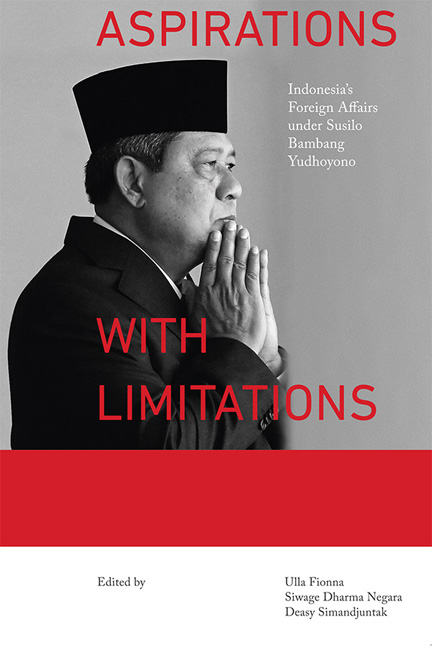Book contents
- Frontmatter
- Contents
- About the Contributors
- 1 Introduction
- 2 Indonesian Foreign Policy: Waging Peace, Stability, and Prosperity
- 3 Indonesia's Diplomatic and Strategic Position under Yudhoyono
- 4 International Economic Cooperation during the Yudhoyono Presidency
- 5 First Term Right, Second Term Shy: A Review of Indonesia's Economic Links with Key Trading Partners
- 6 International Labour Migration: A Very Mixed Blessing
- 7 Law Enforcement, Prevention, and Deradicalization: How SBY Handled Terrorism
- 8 Drifting towards Dynamic Equilibrium: Indonesia's South China Sea Policy under Yudhoyono
- 9 Uneasy Neighbours: Indonesia–Malaysia Relations under Yudhoyono
- 10 A Fair Dinkum Partnership? Australia–Indonesia Ties during the Yudhoyono Era
- 11 The Aceh Peace Process: Wheeling and Dealing behind Closed Doors
- Index
9 - Uneasy Neighbours: Indonesia–Malaysia Relations under Yudhoyono
Published online by Cambridge University Press: 08 June 2019
- Frontmatter
- Contents
- About the Contributors
- 1 Introduction
- 2 Indonesian Foreign Policy: Waging Peace, Stability, and Prosperity
- 3 Indonesia's Diplomatic and Strategic Position under Yudhoyono
- 4 International Economic Cooperation during the Yudhoyono Presidency
- 5 First Term Right, Second Term Shy: A Review of Indonesia's Economic Links with Key Trading Partners
- 6 International Labour Migration: A Very Mixed Blessing
- 7 Law Enforcement, Prevention, and Deradicalization: How SBY Handled Terrorism
- 8 Drifting towards Dynamic Equilibrium: Indonesia's South China Sea Policy under Yudhoyono
- 9 Uneasy Neighbours: Indonesia–Malaysia Relations under Yudhoyono
- 10 A Fair Dinkum Partnership? Australia–Indonesia Ties during the Yudhoyono Era
- 11 The Aceh Peace Process: Wheeling and Dealing behind Closed Doors
- Index
Summary
During the presidency of Susilo Bambang Yudhoyono (SBY), the Indonesia–Malaysia relationship was regarded as one of the most important bilateral relationships in Southeast Asia. This was for two interconnected reasons. First, Indonesia was, and still is, the most populous and powerful nation in the region. Second, given this fact, the bilateral relationship with Indonesia's closest neighbour assumed greater significance than it otherwise would.
In the SBY era, both states constantly reaffirmed their commitment to the relationship, albeit framed in a slightly different way from past eras. Under previous leaders, much was made of the “sibling” identity shared between Indonesia and Malaysia. This notion was based on geographic proximity and a similar colonial and post-colonial history, underpinned by a shared language, a shared culture and a shared religion. The intimacy of the historical ties, which have been conceptualized in various pan-Malay imaginaries, led to numerous leaders from both countries to refer to the bilateral relationship as one premised on “Malay blood brotherhood” or, more commonly, Malay serumpun, which can be glossed as a shared Malay racial or ethnic stock. Under SBY, however, a more prosaic or pragmatic approach was taken, and thus notions of serumpun were deliberately avoided. Nevertheless, underneath SBY's “realpolitik” style was a deep current of genuine and mutual warmth, stretching back to the colonial era, when the independence activists of both countries worked closely together, teaching and inspiring each other.
The Indonesia–Malaysia relationship under SBY's watch was built on a firm foundation of years of interaction at all levels of state and society. During the first decade of the twenty-first century, however, which was marked by SBY's presidency, several issues seriously strained bilateral relations. Among these was the strong public reaction in Indonesia to maritime boundary disputes, claims over each country's cultural heritage, the cross-border impact of haze from Indonesian forest fires, and the poor treatment of Indonesian workers in Malaysia. Indonesia's liberal mass media, a capstone of its democratic consolidation progress under SBY, played a key role in inflaming the tensions. In addition to numerous anti-Malaysia columns, editorials and blogs, several semi-journalistic books discussing the bilateral relationship, often in highly inflammatory language, were published.
- Type
- Chapter
- Information
- Aspirations with LimitationsIndonesia's Foreign Affairs under Susilo Bambang Yudhoyono, pp. 176 - 204Publisher: ISEAS–Yusof Ishak InstitutePrint publication year: 2018

